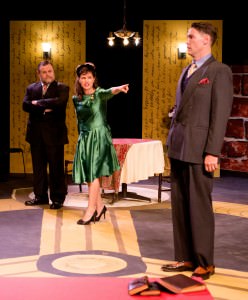The American Century Theater (TACT) touts a mission statement dedicated to the production of “great, important, and worthy American plays of the twentieth century.” In their production of SN Behrman’s Biography, TACT went above and beyond their given goal, revitalizing a somehow forgotten gem of American drama into a thoroughly enthralling and precisely performed dissection of a social climate that is more relevant than ever.

First off, the script is a masterpiece in itself. Set in the very start of the Great Depression, Biography presents a snapshot of Marion Froude, a tantalizing thirty five year-old portrait artist, renowned for her paintings of famous and infamous celebrities alike, along with the sexual escapades that are rumoured to accompany them. However, when affronted with the opportunity to publish a biography recounting her morally laissez-faire adventures, Marion is forced to consider not only her own life but also the political ramifications her story would bring to a former lover, now senatorial candidate. Each character’s disparate outlooks encapsulate the standards of the time, both old world and new, and each scene makes brilliant use of the theatrical medium as social commentary is unobtrusively intertwined with compelling character arcs. The story, set exclusively in an upscale New York apartment is huge in scale, relentlessly witty, endlessly entertaining, and dramatically satisfying. If you haven’t been exposed to this playwright, I highly recommend that you take this opportunity to experience some of his work.
The American Century Theater turned this masterful biography into a masterful production. The black box setting seems like the true home for this script, with a personal intimacy that one can find exclusively in live theater. The direction by Steven Scott Mazzola is airtight. he pace of this long play skipped right along without a single lull and every moment seemed to be deliberately planned and thought out while simultaneously appearing spontaneous and bursting with energy. His blocking made excellent use of the space, moving through a technically excellent ebb and flow of movement that produced stage pictures with depth and allowed new sight lines to develop; a necessity in theater in the round. Mazzola’s hand was clearly present in crafting such a delicate build that fluctuated from comedy to drama without any awkward transitions, all set in a world that was dramaturgically accurate.
The aspect of this cast’s dramaturgical prowess that made the largest impression was their distinct choices in diction. Huge kudos is due to the dialect coach Karin Rosnizeck, whose precise work deepened the realism of the play. Each accent seemed hand crafted for the character, from Marion’s faded Tennessee fluttery patter to the understated German accents, not to mention the three Tennessee local’s who somehow managed to show generational and cultural differences within their own stylizations.
Alison Samantha Johnson’s costumes had excellent design and execution. The subtle color choices told their own story, indicating temperament and suggesting relationships through commons patterns and palettes, all while remaining completely in period. While the script itself may have not lent itself for particularly impressive lighting effects, Lighting Designer Jason Aufdem-Brinke found ways to subtly apply impactful illuminations.
Robert Gato Echanique’s design (built by Jonathan Hudspeth and painted by Annalisa Dias-Mandoly) had some missteps. The design was apparent; the wall treatments of flowing handwritten cursive lit by scones was innovative, and the furniture choices acutely illustrated the shifting time period. The choice to show the setting by placing paintings of the Brooklyn Bridge outside of the window surrounded by other works of art was artistically justified and would have been one of the show’s highlights if they had been properly done. All painting in this show seemed to be rushed, from the unfinished look of the wall writing to the less than professional portrait and landscape paintings (which is especially damaging considering that the protagonist is a painter by trade), and the floor treatment that was meant to suggest inlaid wood came off as hastily applied and detracted from the upper class look it was trying to create. One coffee table did not look like a piece of modern interior design.
Before I talk about each individual actor, I would like to make one note. Each member of this cast of eight was perfectly cast and is a gem in their own right. They were perfectly cohesive and shone without ever outshining one another. The acting in this production was superb and deftly navigated a difficult script.
Jennifer J. Hopkins made an astounding Marion Froude. Her flourishes and enchanting smile made her one of many magnetic performances, demonstrating a powerful arc while capturing the affluent silliness without becoming irritating. It was hard to take your eyes off this self-sufficient “modern” woman as she created an engrossing character fit for the biography she was writing.
Daniel Corey, playing Richard (Dicky, as Marion affectionately refers to him) Kurt, made what could have been an absolutely repugnant yuppie into a respectable and sympathetic hero. As a self-made man at the age of twenty five, Kurt has put up walls of flippancy and emotional detachment to avoid facing his painful past. Corey’s performance unraveled this man completely believably, performing with intricate layers concealed by a front of obnoxious cynicism. The degree of difficulty to make this character come to life with such intensity and realism seems incredibly high to this reviewer, and I was mesmerized by Corey’s dramatic meticulousness.

Marion’s estranged first love Leander “Bunny” Nolan aptly portrayed the political correct front of a senatorial candidate while occasionally letting cracks of insecurity and real emotions show through his facade. Melchior Feydack, and composer posing as his famous brother, was played by Craig Miller, whose self-deprecating humor made him a comedic highlight and an adorable, understated character.
Joe Cronin’s Orrin provided humor on the opposite side of the comedic spectrum, creating hilarious moments in a farcical, bombastic style as he overpowered scenes with his booming southern accent and physical presence.
Caitlyn Conley’s Slade complimented Hopkins’ performance, creating an equally modern woman except with a lot more sass and confrontational swagger. Even those with miniscule amounts of stage time (Frank Britton as the actor Warwick Wilson and Cam Magee as the German maid Minnie) made impacts with their complete commitment and comedic contributions.
The American Century Theater’s production of Biography radiates with theatrical energy, putting forth an entertaining and moving piece of theater. Biography is truly special and is a ‘Must See.’
Running Time: Two hours and fifty minutes, with one intermission.
Biography plays through June 29, 2013 at The American Century Theater at Gunston Theatre Two – 2700 South Lang Street, in Arlington, VA. For tickets, call the box office at (703) 998-4555, or purchase them online.





